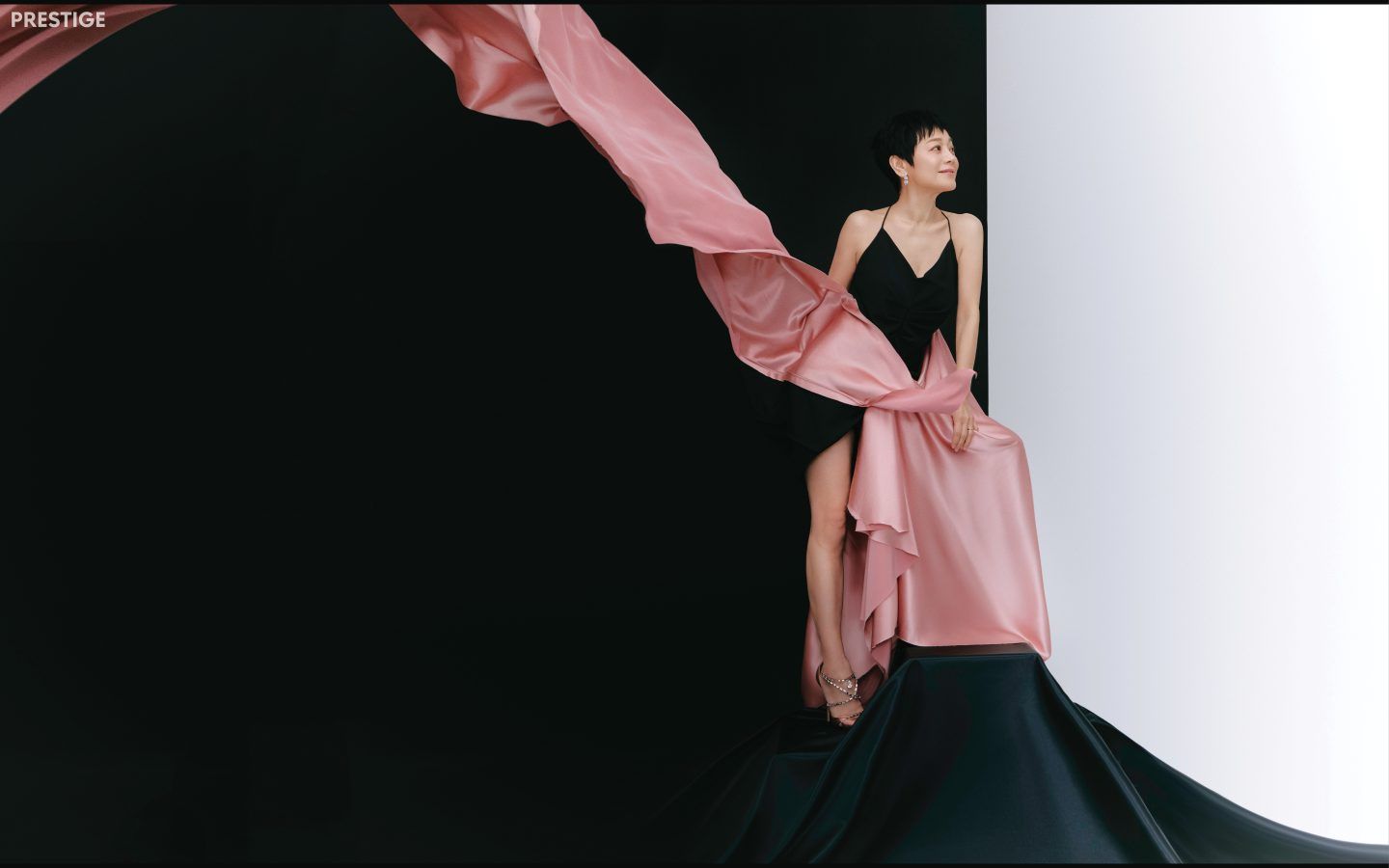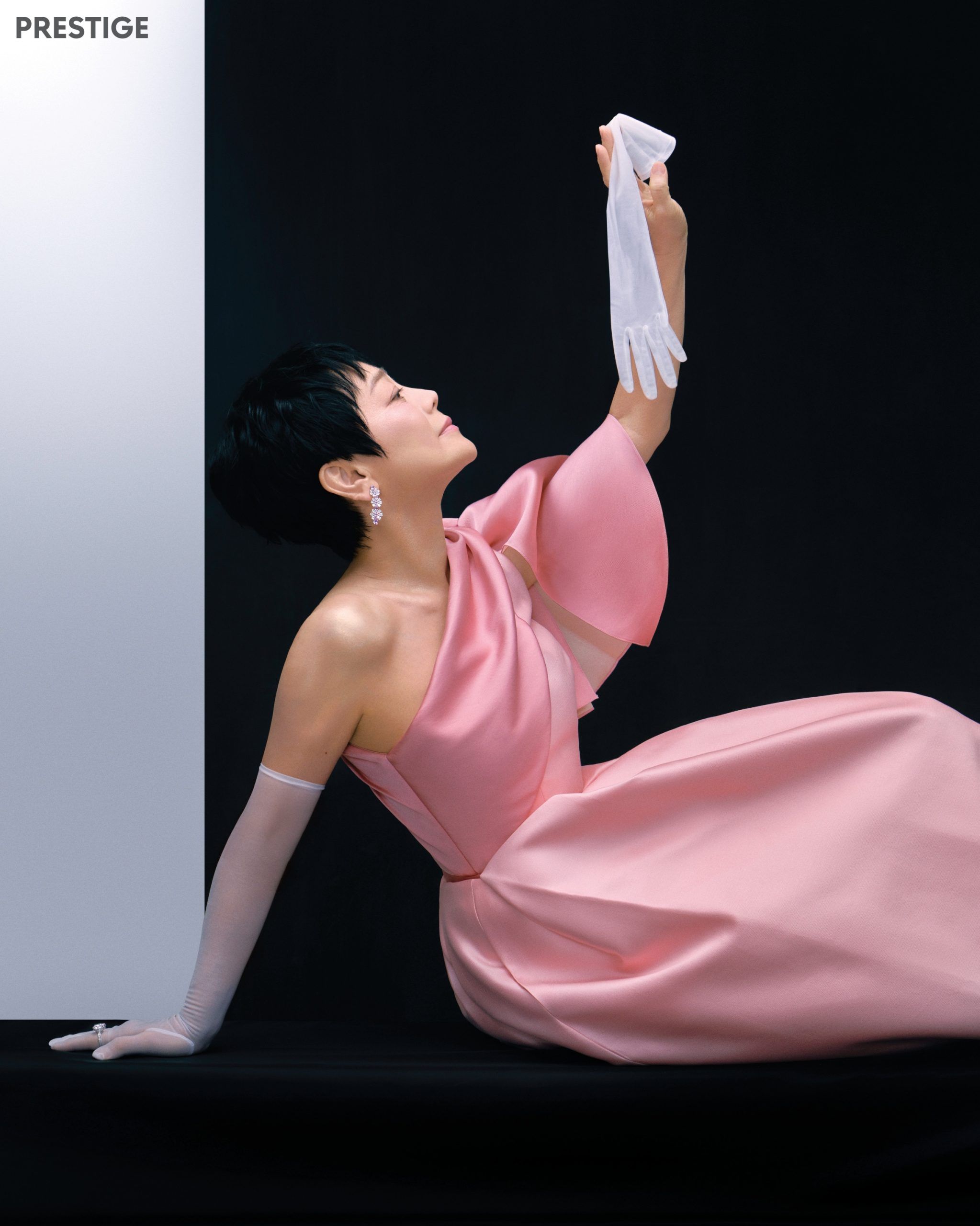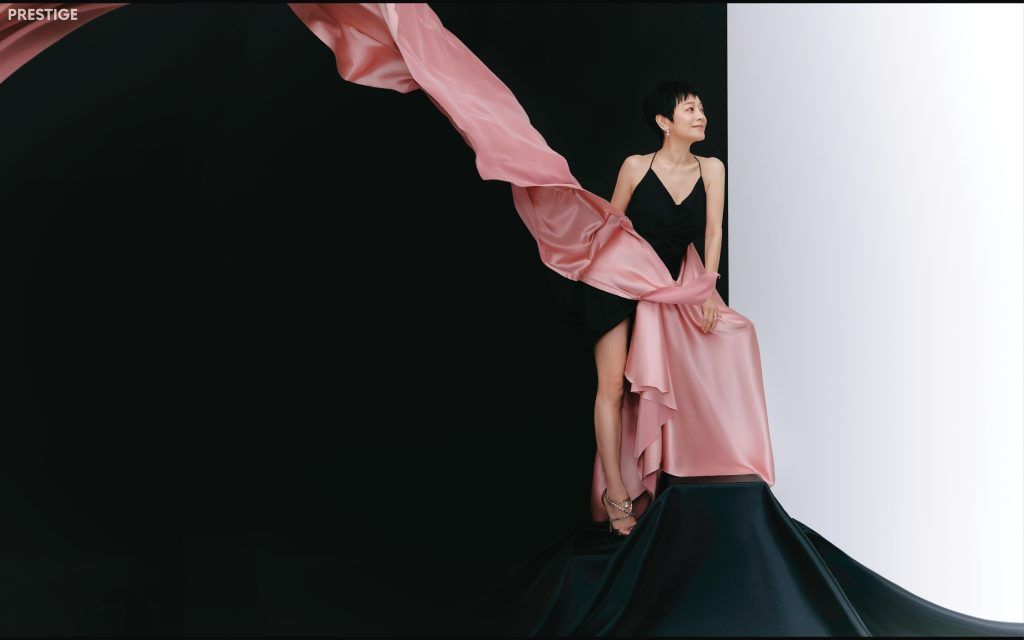Sylvia Chang Wants Us to Go to the Movies


Actress-singer-director-scriptwriter Sylvia Chang would really love it if you’d stop pressing the “continue watching” button on Netflix and head straight to a cinema. Now.
Words JOEY WONG
Creative Direction and Styling ALVIN GOH
Photography REUBEN FOONG
Retouching XU PENG
Make-up ANNIE G CHAN
Hair KIKI SIN at La Biosthetique
Photography Assistants KO PO LUN, CLIFF CHIK
Styling Assistants VICTORIA, HEBE

Sylvia Chang doesn’t want to say goodbye. Not yet. Possibly not ever. It’s the same forlorn predilection that torments Heung, a mourning widow Chang plays in her latest film, A Light Never Goes Out, who grapples with the death of her late husband by trying to keep his critically endangered neon trade alive.
The loss is similar to the one that plagues Chang herself, as she accepts her third Best Actress Golden Horse for the role – and likens, at the brink of tears, the lure of mass-produced LEDs to the siren call of smaller screens, fearing the imminent disappearance of the cinemas she’s so very fond of.
Yet with a career as multifarious and exceedingly chameleonic as Chang’s, it seems as if farewells would be something she’s intimately familiar with. An expected if slightly devastating occupational hazard, especially when her medium of choice has always been given a lease of life that hovers at departure near 90 minutes of run-time. Not so. “Well, I’d still love to maybe perform as a singer one day,” Chang wonders out loud, assiduously leaving each door she’s once traversed through swung a nudge ajar. She might just come back to it.

At 16, Chang was a radio host in Taiwan with dreams of becoming a singer. Competing in televised singing competitions landed her record deals – her Mando-pop ballad “The Price of Love” continues to be a karaoke mainstay – and, spoiler alert, her very first film part. It was a fortuitous meet-cute that would define the rest of her career and, with it, the rest of her life.
“With singing, it was just my hobby,” she says. “I love singing, but that wasn’t really my main interest. With film, I just knew. Immediately. I found this endless, this unlimited … thing that I could really dig into. That it’s something I want to work on for the rest of my life.”
A promise Chang has diligently kept in the 50-or-so years since her screen debut in The Flying Tiger, film has been an ever-looming, ever-loving constant. She’s kicked and fought in martial-arts flicks. She’s pulled guns and acquiesced to being slapped, for real, by Karl Maka in Aces Go Places. Again. And again. And again. She’s watched, in abject horror, as Chow Yun-fat went aflame in All About Ah-Long’s shocking ending … and reunited with Chow almost three decades later in Office. She’s played jilted lovers, played cloying mothers. And she’s screamed, scoffed and guffawed in screwballs and slapsticks. But most ardently, she’s cried. Oh, how she’s cried.
Yet, like all love affairs – and Chang, who’s something of a weepie savant, knows a thing or two about love affairs – it hasn’t always been easy; at times, it’s been difficult. Early on, she was switched out for Brigitte Lin twice over; the first, in Eight Hundred Heroes, after director Ting Shan-hsi practically promised her the female lead. The second, in The Dream of the Red Chamber, for the dashing role of Jia Baoyu Chang so desperately wanted.
And, other times, still, it’s been downright impossible.
At the helm of delivering her directorial debut, Once Upon a Time, Chang recalls crying – she cries! – through a press junket. She’d just won her first Best Actress Golden Horse earlier that same year for My Grandfather when she accepted this directing gig. It felt like a timely gear shift.
“I was 20-some years old when I directed my first film,” she says. “I had so much interest in writing, and I wasn’t really thinking about directing. I was just very keen to get behind the camera. And, actually, I wasn’t ready, but then this opportunity came. And I just grabbed at the chance and went along with it. And I found I knew very little about directing.”
The opportunity was already inopportune at inception; Chang was substituting for the original director, Tu Chung-Hsun, after a car wreck that proved tragically fatal. “I got really drunk,” she says, “and I told the press I did a bad job.”
“But that gave me a chance to go back as an actress as a beginner,” she says. “And if I wanted to direct again, I knew I had to work harder, and I’d have to learn.”

Learning, for Chang, didn’t happen within the rigidity of classroom walls nor by perusing film school syllabi. She learned by doing: by watching films alongside dubbing veterans as they worked; by fully immersing herself in the thick of it. Even if it meant flying to Korea and waiting on-set for director King Hu to then cut her second-long scene. Even if it then meant spending six-plus months on the very same set fiddling with liquid nitrogen, styling extras, helping with make-up, attending to the tasks of a production assistant as a budding star actress.
“I think I have more freedom,” she says, her lack of a formalised acting-directing education never something she feels had held her back. “I feel freer to do what I think should be done. And as long as I provide what I feel in here,” she gestures at her heart, “and if the director accepts and it touches people, then I think it’s good.”
Being good, for an actor on this side of the Pacific, has often meant going West. But Chang, who’d split time between Taiwan, Hong Kong and the United States in her youth, had already gone west … and come home. “So I didn’t do this project with Robert DeNiro …” Chang rattles on, “ … I even met Madonna and Sean Penn when they were doing Shanghai Surprise. And I just walked out because I really thought that wasn’t a very good script.” Her voice darkens, conspiratorially.
She’s recalling the flower-vase girls that bored her so as a young actress signed to Golden Harvest at the start of her career, delegated to no more than pretty window dressing between hulking, sulking men. It’s the only time she’s ever wondered about her future in the industry. And these would be the roles she’d be offered, tokenised and backgrounded, opposite international film stars she supposed would be exciting to work with.
“I just couldn’t go back to being the BS flower vase,” she concedes.
In the years since, Chang says, Hollywood has made strides. “There’ll be more coming up, which is quite exciting,” she says, Michelle Yeoh’s historic triumph a happy inflection. “But at the same time, I also wish there’s more we can do from here in Asia. That even our Chinese-speaking films can go abroad and be acceptable.”
“I even met Madonna and Sean Penn when they were doing Shanghai Surprise. And I just walked out because I really thought that wasn’t a very good script”
Sylvia Chang
To wit, she mentions an interview she’s read online, of Scottish director Charlotte Wells who spoke of sobbing, inconsolable, through Murmur of the Hearts, a film Chang directed. Chang, whose faith also lies heavily upon her own tear ducts, was honoured. And incredulous.
“I was very surprised where she got to see the film,” she exclaims. “I just feel that there must be a channel or there must be something that we all feel in common. We have something we can all share together. I always believe in emotions about love, about family. About relationships. There must be something we all have in common.”
This universality Chang speaks of is what drives her, what motivates her. And what, ultimately, moves her. “When you read a script, you have intuition about how it hits you, where it hits you,” she says. “It hits me in the heart. And whenever I talk about it, whenever I even think about it, there are tears in my eyes. And I just want to know, what is it like? I want to dig deep into every character. What happened to them, at that time, for them to make that decision? Did they make a mistake, or did they make a judgment? What happened?”
As Chang asks rhetorical question after rhetorical question at rapid-fire speed, as though saying out loud what must have rumbled inside her mind as she penned her scripts, it’s absolutely clear why she’s a superlative storyteller. She’s curious. She’s curious about the characters on her page. She’s curious about the ways she can make them real, make them complex, difficult. Make them human.
And she cares.
Whereas Tsui Hark was mercurial – he’d change the screenplay at a moment’s notice – Edward Pang was detail-oriented, meticulously so. Johnnie To had myriad ideas but never a completely written screenplay.
“All these directors,” Chang starts, “they all have very, very strong personalities. And the one thing they’ve told me is you’ve got to have your own language as a creator. And even though I complained about it sometimes, that’s just the way they work.”

“I think I’m very gentle,” she surmises of her own directorial style. “I’m very observant. And I like to see what everybody can provide, especially when I’m on a set. I believe in good talent, of people who care about their own work. Because that’s what I want. I want people to give me more, more than what I can think of, what I can imagine.
“Especially for melodramas, you need to have a good cameraman who not only has good eyes, but understands what drama is,” she insists. “And they also need to be very observant about what’s going on, not only through the lens but outside of the lens.”
She generously calls out one frequent collaborator, the Taiwanese cinematographer Mark Lee. “He’s quite unique as a master of his own work,” Chang enthuses, “because he’s always looking at the camera with both eyes open. Usually, you see cameramen with one eye open and the other eye closed, but he always has both eyes open. The other eye is looking at what’s going on beyond the lens, and if he sees anything – even without telling me as a director – he’d pan over to capture it, instinctively.”
Chang’s first Golden Horse nomination for directing would arrive a mere five years after the junket fiasco that first ruined her directorial confidence. In the years since, her rolodex of nominations and awards would pile up, and pile high in categories well beyond acting. And had she been asked 10 years ago, she’d have said receiving accolades for directing, out of everything she’s been gold-starred for, would feel the most gratifying.
“Because directing is actually more difficult,” she says. “But now, I just don’t think it’s only directing. Because I do find directing, scriptwriting and even producing difficult. They’re all difficult, but they’re all exciting. And they’ve all given me so many good memories.”

These days, Chang is marvellously busy. She’s turning 70 this summer and not at all worried about the wrinkles scored ever so gently through the planes of her face, her hands. She’s now three decades past the age she once set as the limit for “good roles”; it didn’t matter, she wrote new roles – directed them, too. She’s defiantly vexed at being asked about retirement. She’ll work, she says, as long as there’s work coming along that’s interesting, that’s challenging.
She’s currently in rehearsals with the Shanghai Orchestra Symphony for a performance of Midsummer Night’s Dream, for which she plays narrator. She’s working on a script that’s 10 years in the making about the air force (she’s keeping mum about the details, but her father, who died when she was just one year old, was in the military). She’s worried about the newer cadre of filmmakers’ reliance on “post”, she air-quotes. She’s designing curriculum for the annual Artistic Creation summer camp she helped set up for students in Taiwan interested in the arts. She’s watching old Japanese black-and-whites and almost through a book on breathing techniques. And she’s doggedly not watching Netflix.
“Everyone stays home and watches Netflix,” Chang says, groaning. “They say, ‘Oh, which episode are you on?’
“I always remind people that going to the theatre is totally different from staying home and watching television series. The problem nowadays is that all the big theatres have closed down. We’re left with small houses. And a small house is becoming so small it’s very much like home now. So what’s the difference? Of going to small-house theatres than to stay home and watch?
“Theatres should always have a screen that’s bigger than the TV at home, and have distance,” she sermonises, passionately. “And it’s completely dark and you have other people sharing with you. Watching TV series is home entertainment. But going to the theatre is going out. It’s social entertainment. It’s totally different. Would you sit at home and eat popcorn? Not really, right? You might drink a beer but you wouldn’t eat popcorn. But at the theatre, you always want to buy popcorn. All these things … all these little things make going to the theatre to watch a film different.”
It’s different. And important. And rarefied. For the price of entry, it’s Plato’s Cave, a darkened instance shared between strangers sitting, shoulder to shoulder, suspending, if only for a mere moment, the ails of the real for the utter magic of the reel. Where oversized neon signage can still be erected in an image of Hong Kong we still remember. Where love can be lost and miraculously found in the run-time it takes to traverse meaningfully through three narrative arcs. Where a bark of a laugh might just prompt yours; an errant sniffle might just remind you, you with the wet eyes and the wet nose, that we’re not so different. That we’re not so alone, after all.
Then, the credits roll.
The music swells.
The theatre lights flicker on.